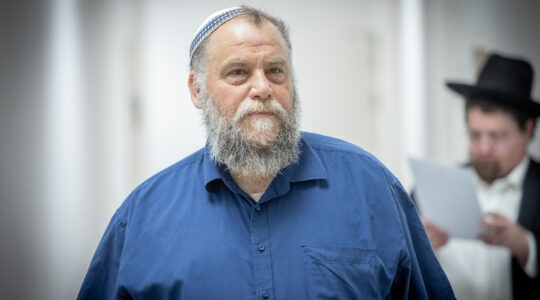ISRAEL VOTES 2009: CANDIDATE PROFILE
JERUSALEM (JTA) — One month ago, Ehud Barak made his maiden appearance on “Glorious Land,” Israel’s version of “Saturday Night Live,” and was roundly roasted about his Labor Party’s poor prospects ahead of the Feb. 10 election.
Though the former prime minister weathered it all with good humor, his flat delivery and occasional line-flubbing were noted by pundits who deplored the lengths to which Israeli politicians now are willing to go to campaign.
But Barak probably was preoccupied with something: He had just come from a secret meeting with Prime Minister Ehud Olmert and Foreign Minister Tzipi Livni at which they gave a green light to a blinding blitz on the Hamas-run Gaza Strip. The war began shortly thereafter.
The surprise of the assault, which gutted Hamas capabilities before the group could muster a response, certainly was helped by the stealth tactics of Barak, Israel’s 66-year-old defense minister. Government leaders generally do not go on satirical TV shows right before they go to war.
And though there is debate over the long-term gains of the 22-day offensive, few in Israel challenge that it was a brilliantly executed campaign that atoned for the setbacks of the 2006 Lebanon war. Barak, a decorated former commando and military chief of staff, is getting the lion’s share of credit for it.
A Ma’ariv survey of public sentiment about the Gaza war gave Barak a 73 percent approval rating — higher than Olmert or Livni.
It may well be that Barak expected an electoral payoff, too.
As the “Glorious Land” sketch ended, with one actress telling Barak he had no chance of retaking top office, he smiled enigmatically and waved her off. His campaign manager, Shalom Kital, later paraphrased the defense minister’s gesture as “wait and see!”
“When Israelis go to cast their ballots, the moment of truth, we believe they will vote for the man with a proven record of professionalism and experience,” Kital told JTA.
But while center-left Labor is now set to win 14 or 15 of the Knesset’s 120 seats, twice the number predicted before the offensive, Barak continues to trail Livni, his rival from the centrist Kadima Party, and the front-runner, Likud’s Benjamin Netanyahu. Polls show that Labor’s third-place ranking is even in doubt, with the right-wing Yisrael Beiteinu party rising precipitously amid Israel’s security jitters.
“Though the public generally commends Barak for his performance during the war, it does not see him as a candidate for prime minister,” noted Ma’ariv’s political correspondent, Maya Bengal.
The paradox doubtless puzzles some observers outside Israel. In a nation perpetually at war, Barak has shown mettle both for battle and diplomatic strategies of engagement and containment.
Born Ehud Brog in Kibbutz Mishmar Hasharon, the younger Barak was a cowboy with a flair for cerebral pursuits such as classical piano and stripping and rebuilding Swiss watches. This combination made him a perfect fit for Sayeret Matkal, Israel’s most elite commando unit, which he joined at age 17 and where he would change his last name to Barak, Hebrew for “lightning.”
While physically small, Barak did not lack for courage or ingenuity. He clambered up the ranks, overseeing operations such as the 1972 raid on a hijacked Sabena airliner and, a year later, the assassination of PLO leaders in Beirut. In the latter operation, he infiltrated dressed as a woman, lugging grenades in his brassiere.
Having garnered a record number of military decorations, Barak became Israel’s top general just as the first rapprochement efforts with the Palestinians were getting under way in the early 1990s. He naturally cleaved to Prime Minister Yitzhak Rabin, another former chief of staff, and the alliance paved the way for Barak to join Labor when he left the military.
After Rabin’s assassination in 1995 by a right-wing zealot, elder statesman Shimon Peres took over Labor and assumed the premiership, only to be trounced in elections by the firebrand Netanyahu.
Riding a wave of Laborite hunger for a young warrior-peacemaker at the helm, Barak became party leader and toppled Netanyahu in 1999 elections. But the single-minded Napoleonic energy that brought Barak such speedy political success would prove to undermine him in both the personal and diplomatic spheres.
Many party comrades, such as Avraham Burg in the 1990s and, more recently, Ami Ayalon, would describe Barak as vexingly inscrutable, keeping his own counsel and issuing orders — whether on key matters of national defense or on the pettier dispensations of Labor policies — with all the warmth of a martinet.
Then there was his breakneck peace negotiations with Syria and the Palestinians, which delivered only disappointment and made many Israelis question whether Barak’s promised concessions would merely embolden enemies of the Jewish state. Such fears were further underscored by Barak’s decision to pull Israeli troops out unilaterally of southern Lebanon in 2000 — a move now recognized as having prompted Yasser Arafat to order the Palestinian terrorist campaign of the second intifada in the West Bank and Gaza.
Barak was ousted by the Likud’s Ariel Sharon in 2001 and spent the next six years making money in the private sector, working as a business consultant abroad. He also divorced his telegenic wife, Nava, with whom he has three daughters, and married a childhood sweetheart, Nili.
When he made his political comeback not long ago, Barak pledged that he had “learned his lessons” and “changed.”
It was a hard sell.
Barak narrowly beat Ayalon for the Labor leadership in 2007 amid allegations of vote rigging. He bought a swank apartment in Tel Aviv that did not square with Labor’s traditional frugal ethos. Nili Barak, who advises foreign investors about opportunities in Israel, was accused in the Israeli media of profiting from her husband’s government contacts.
Labor, meanwhile, was in ideological entropy. Directly descended from Mapai, the party of Israel’s founders, Labor had seen much of its credibility blown away along with the Oslo peace process. It needed a new direction.
Barak appeared willing to provide this when he called on Olmert to resign over the failures of the 2006 war with Hezbollah. But Barak did not pull Labor out of the Kadima-led coalition government and happily assumed the defense portfolio after his disgraced predecessor, Amir Peretz, surrendered it. Furthermore, Israeli peaceniks routinely deplored Barak’s failure to crack down on illegal settler outposts in the West Bank.
Nahum Barnea, senior commentator for Israel’s daily Yediot Achronot, summed up Barak this way: “He’s a gifted, brilliant, sober observer who can analyze the political and security situation better than anyone else. But he does not have the patience, the ability to engage in dialogue or the understanding of people to change the situation for the better. His mind is long; his arm is short.”
Even Olmert, who praised Barak over the Gaza offensive, turned on him, saying in an interview last week, “I’ve never deluded myself that Barak feels comfortable when he sits on the wrong side of the prime minister’s desk. I’ve never thought he felt comfortable and Barak, you know, finds it hard to conceal his body language, and you can sense this immediately.”
Giving up on any chance of overhauling Barak’s reputation, Kital’s team has opted to capitalize on all the negativity in the Barak campaign.
Labor’s posters throughout Israel show the grim-faced defense minister with the slogans “NOT a pal, NOT trendy — a LEADER!”
Barak’s official goal is to become prime minister. But Kital acknowledged that it would be a major challenge, and not only because of his candidate’s lackluster showing in the polls.
“Recent history showed that when Labor became the ruling party, in 1992 and 1999, it was right after it had led the political opposition,” Kital said. “Labor’s current place in the coalition makes it hard to gain primacy, as many of those who support the incumbents will gravitate toward the ruling party, Kadima.”
Votes for the opposition, meanwhile, will go to right-wing parties such as Likud and Yisrael Beiteinu.
That leaves the possibility that Barak is angling for another term in the Defense Ministry, which wields sweeping power in the Israeli political echelon.
Another Labor campaign poster shows Barak flanked by his rivals. While Livni and Netanyahu appear to be staring off vaguely into space, Barak gazes confidently at the viewer. There is a possible subtext to this unusual triptych, suggesting that the next government will be a coalition with Labor as its linchpin. Indeed, Israeli media reports suggest Netanyahu and Barak already have secretly sealed an alliance.
While the gains of the Gaza offensive may well have helped Barak keep the defense portfolio, he is not guaranteed to keep it after the elections. Should Yisrael Beiteinu enter a deal with Netanyahu, its leader, Avigdor Lieberman, could demand the Defense Ministry for himself. That, in turn, may return Labor to the opposition.
Amotz Asa-El, a fellow at the Shalem Center think tank in Jerusalem, played down the political advantages of the Gaza offensive to Barak.
“If there is a political aspect here, I think it was in Barak’s apparent lack of fear of losing votes in the wake of the operation,” Asa-El said. “He may have said to himself, ‘What have I got to lose?’ But that’s not the same as ‘What I have I got to gain?’ “





